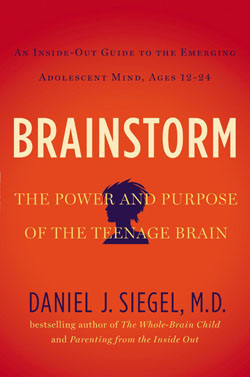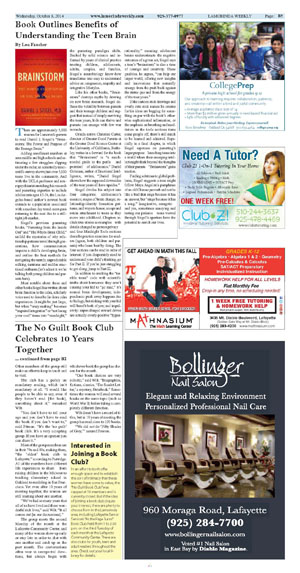|
|
Published October 8th, 2014
|
Book Outlines Benefits of Understanding the Teen Brain
|
|
| By Lou Fancher |
 |
| |
There are approximately 5,000 reasons for Lamorinda parents to read Daniel J. Siegel's "Brainstorm: The Power and Purpose of the Teenage Brain."
 Adding enrollment numbers at area middle and high schools and estimating a few stragglers slipping under the radar, an admittedly unscientific survey shows just over 5,000 teens live in the community. And with the UCLA professor and neuropsychiatrist stretching his research and parenting expertise to include adolescents ages 12-24, the Los Angeles-based author's newest book extends to a population associated with a modern day trend: next-gens returning to the nest due to a still-tight job market.
Adding enrollment numbers at area middle and high schools and estimating a few stragglers slipping under the radar, an admittedly unscientific survey shows just over 5,000 teens live in the community. And with the UCLA professor and neuropsychiatrist stretching his research and parenting expertise to include adolescents ages 12-24, the Los Angeles-based author's newest book extends to a population associated with a modern day trend: next-gens returning to the nest due to a still-tight job market.
 Siegel's previous parenting books, "Parenting from the Inside Out" and "The Whole-Brain Child," unfold the mysteries of why relationship patterns travel through generations, how communication impacts a child's developing brain, and outline the best methods for navigating the unruly, unpredictable sulking, tantrums and sudden emotional outbursts (let's admit it: we're talking both young children and parents here).
Siegel's previous parenting books, "Parenting from the Inside Out" and "The Whole-Brain Child," unfold the mysteries of why relationship patterns travel through generations, how communication impacts a child's developing brain, and outline the best methods for navigating the unruly, unpredictable sulking, tantrums and sudden emotional outbursts (let's admit it: we're talking both young children and parents here).
 Most notable about these and other books Siegel has written about brain function is the calm, scholarly voice used to describe far-from calm experiences. It might be just lingo, but when "crazy making" becomes "impaired integration" or "not losing your cool" turns into "mindsight," the parenting paradigm shifts. Backed by solid science and informed by years of clinical practice treating children, adolescents, adults, couples, and families, Siegel's neurobiology know-how transforms into easy to understand advice on compassion, empathy and integrative lifestyles.
Most notable about these and other books Siegel has written about brain function is the calm, scholarly voice used to describe far-from calm experiences. It might be just lingo, but when "crazy making" becomes "impaired integration" or "not losing your cool" turns into "mindsight," the parenting paradigm shifts. Backed by solid science and informed by years of clinical practice treating children, adolescents, adults, couples, and families, Siegel's neurobiology know-how transforms into easy to understand advice on compassion, empathy and integrative lifestyles.
 Like his other books, "Brainstorm" destroys myths by drawing on new brain research. Siegel defuses the volatility between parents and their teenage children and suggest that instead of simply surviving the teen years, kids can thrive and parents can emerge with few war wounds.
Like his other books, "Brainstorm" destroys myths by drawing on new brain research. Siegel defuses the volatility between parents and their teenage children and suggest that instead of simply surviving the teen years, kids can thrive and parents can emerge with few war wounds.
 Orinda native Christine Carter, director of Greater Good Parents at the Greater Good Science Center at the University of California, Berkeley, writes in a forward for the book that "Brainstorm" is "a much-needed guide to the perils - and promise! - of adolescence." Daniel Goleman, author of Emotional Intelligence, writes, "Daniel Siegel shows how the supposed downsides of the teen years all have upsides."
Orinda native Christine Carter, director of Greater Good Parents at the Greater Good Science Center at the University of California, Berkeley, writes in a forward for the book that "Brainstorm" is "a much-needed guide to the perils - and promise! - of adolescence." Daniel Goleman, author of Emotional Intelligence, writes, "Daniel Siegel shows how the supposed downsides of the teen years all have upsides."
 Siegel divides his subject into four categories: adolescence's essence; stages of brain change; relationship-identity formation patterns; and ways to honor, accept and retain attachment to teens as they move into adulthood. Chapters include true stories as examples - with details changed to protect privacy - and four Mindsight Tools sections describe practice exercises for readers (again, both children and parents) who learn best by doing. The four sections can be read in order of interest: if you desperately need to understand your child's thinking, go for Part II. If you're just struggling to get along, jump to Part III.
Siegel divides his subject into four categories: adolescence's essence; stages of brain change; relationship-identity formation patterns; and ways to honor, accept and retain attachment to teens as they move into adulthood. Chapters include true stories as examples - with details changed to protect privacy - and four Mindsight Tools sections describe practice exercises for readers (again, both children and parents) who learn best by doing. The four sections can be read in order of interest: if you desperately need to understand your child's thinking, go for Part II. If you're just struggling to get along, jump to Part III.
 In addition to cracking the "terrible teens" code with scientific truths about hormones: they aren't causing your kid to "go mad," it's normal brain development; independence: push away happens due to biology, but sticking with your kid will benefit both of you; and impulsivity: super-charged reward drives are actually overly-positive "hyper-rationality," meaning adolescent brains underestimate the negative outcomes of a given act, Siegel says a teen's "brainstorm" is also a time of courage and creativity. These qualities, he argues, "can help our larger world, offering new insights and innovations that naturally emerge from the push back against the status quo and from the energy of the teen years."
In addition to cracking the "terrible teens" code with scientific truths about hormones: they aren't causing your kid to "go mad," it's normal brain development; independence: push away happens due to biology, but sticking with your kid will benefit both of you; and impulsivity: super-charged reward drives are actually overly-positive "hyper-rationality," meaning adolescent brains underestimate the negative outcomes of a given act, Siegel says a teen's "brainstorm" is also a time of courage and creativity. These qualities, he argues, "can help our larger world, offering new insights and innovations that naturally emerge from the push back against the status quo and from the energy of the teen years."
 If the cartoon stick drawings and overly cute nick names he creates for his ideas are begging for something on par with the book's otherwise sophisticated information, or the emphasis on breathing and meditation in the tools sections turns some people off, there's still much to be learned and admired. Especially in a final chapter, in which Siegel espouses on parenting's larger purpose - launching teens into a world where their emerging intellect might think beyond the thoughts of their parents - "Brainstorm" gains traction.
If the cartoon stick drawings and overly cute nick names he creates for his ideas are begging for something on par with the book's otherwise sophisticated information, or the emphasis on breathing and meditation in the tools sections turns some people off, there's still much to be learned and admired. Especially in a final chapter, in which Siegel espouses on parenting's larger purpose - launching teens into a world where their emerging intellect might think beyond the thoughts of their parents - "Brainstorm" gains traction.
 Finding solutions to global problems, Siegel suggests a teen might follow Maya Angelou's paraphrase of an old Chinese proverb and not be like a bird that sings because it has an answer, but "sings because it has a song." Imaginative, energetic - and yes, sometimes annoying and testing our patience - teens viewed through Siegel's aperture have the potential to enrich our lives.
Finding solutions to global problems, Siegel suggests a teen might follow Maya Angelou's paraphrase of an old Chinese proverb and not be like a bird that sings because it has an answer, but "sings because it has a song." Imaginative, energetic - and yes, sometimes annoying and testing our patience - teens viewed through Siegel's aperture have the potential to enrich our lives.

|
|
|
|
|
|
|
|
|
| |
|
|
|
|



